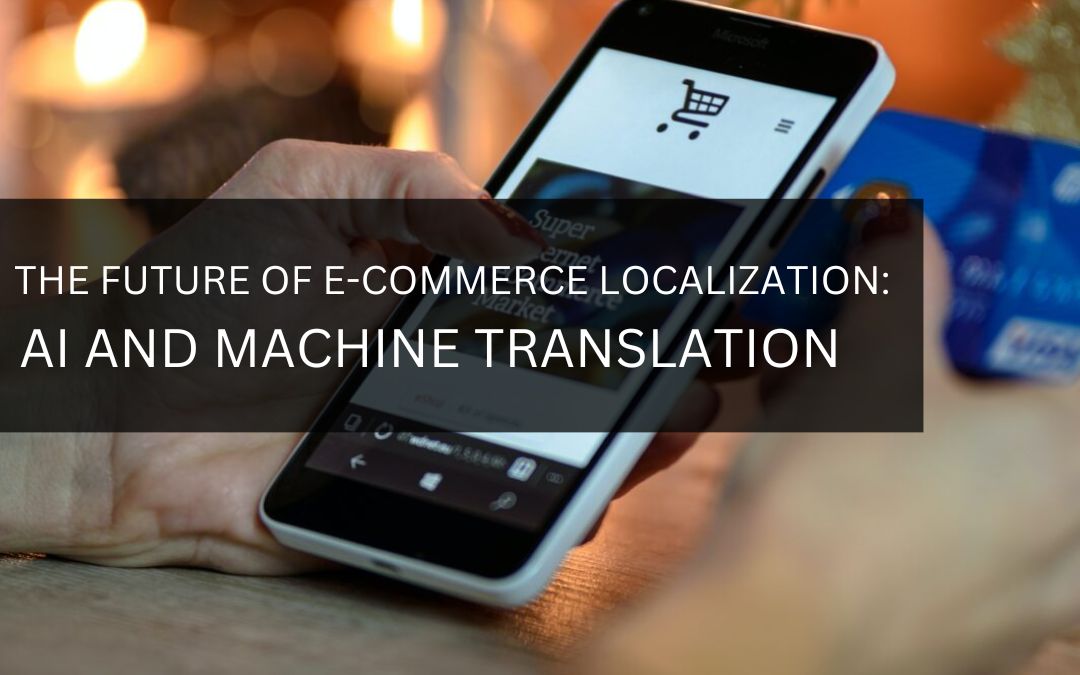As the world becomes increasingly interconnected, e-commerce businesses are expanding their horizons to cater to global audiences. One of the driving forces behind this expansion is the rapid advancement of AI and machine translation technologies. In this blog post, we’ll explore the key points on how AI and machine translation are shaping the future of e-commerce localization.
1. Introduction to Machine Translation (MT)
Machine translation, or MT, has come a long way from its early, often inaccurate, iterations. Traditional rule-based and statistical MT systems have paved the way for more sophisticated neural machine translation (NMT). NMT models, powered by artificial neural networks, can understand context and nuances in language, making translations more accurate and context-aware. This development is a game-changer for e-commerce localization, as it allows businesses to provide more natural and engaging content to their international customers.
2. Advancements in Neural Machine Translation (NMT)
Neural Machine Translation (NMT) is the engine driving the transformation of machine translation. NMT models, based on deep learning techniques, have revolutionized the translation landscape. These models can process entire sentences and consider the surrounding context, resulting in translations that are not only more accurate but also fluently adapted to the target language. For e-commerce, NMT means product listings, descriptions, and customer communication can be localized with unprecedented precision, enhancing the user experience for global customers.
3. The Role of Artificial Intelligence (AI) in Translation
AI plays a pivotal role in the future of e-commerce localization. Machine learning and natural language processing are at the heart of AI-driven translation advancements. AI-driven translation models can adapt to evolving language trends and user preferences, ensuring that e-commerce content remains relevant and engaging. AI also enables real-time translation, breaking down language barriers in customer support and enabling live chat interactions with international customers.
4. Real-Time Translation Services
Real-time translation services are a game-changer for global e-commerce. These services leverage AI and machine translation to provide instant translations of product descriptions, reviews, and customer queries. This means that customers can browse and shop in their native language without delay, creating a seamless and satisfying shopping experience. Real-time translation services are particularly valuable for e-commerce platforms, enabling them to tap into new markets and serve a diverse customer base efficiently.
5. Customized Translation Models
AI allows for the creation of customized translation models tailored to specific industries or domains. This level of customization ensures that e-commerce businesses can maintain consistent branding and adapt to industry-specific terminology across different markets. Whether you’re selling fashion, technology, or healthcare products, AI-powered translation can ensure that your e-commerce content is not only accurately translated but also aligned with industry standards and expectations.
6. Multilingual Chatbots and Virtual Assistants
AI-powered chatbots and virtual assistants are becoming indispensable tools for e-commerce localization. These intelligent systems can engage with customers in multiple languages, answer product queries, provide recommendations, and even process orders seamlessly. For e-commerce businesses, this means that customers from different regions can enjoy personalized and efficient interactions, ultimately boosting customer satisfaction and sales.
7. Quality Control and Post-Editing with AI
AI doesn’t just assist in initial translation but also plays a vital role in quality control and post-editing. Translation models can flag potential errors or inconsistencies, making the editing process more efficient for human translators. This not only reduces the chances of translation errors but also speeds up the localization process, ensuring that product listings and content are available to international customers faster.
8. Data Privacy and Security
As AI and machine translation rely on vast amounts of data, data privacy and security are paramount concerns. E-commerce businesses must ensure that customer data, including sensitive information like payment details and personal data, is protected rigorously. Compliance with data protection regulations like GDPR (General Data Protection Regulation) is essential to maintain trust with international customers.
9. Language Preservation and Endangered Languages
AI-powered translation technologies have the potential to contribute positively to language preservation efforts. By making translation resources more widely accessible, these technologies can help document and revitalize endangered languages. E-commerce platforms can play a role by offering product information and content in less commonly spoken languages, thereby promoting linguistic diversity.
10. Challenges and Ethical Considerations
While AI and machine translation hold immense promise, they also present challenges and ethical considerations. Biases in training data can lead to biased translations, and the overreliance on AI may lead to job displacement in the translation industry. It’s crucial to address these challenges and ensure that AI is used ethically, with human oversight and continuous efforts to mitigate biases.
In conclusion, the future of e-commerce localization is deeply intertwined with AI and machine translation technologies. These advancements are enhancing the user experience, enabling efficient multilingual communication, and expanding the reach of e-commerce businesses to global markets. However, it’s essential for businesses to navigate the challenges and ethical considerations associated with AI and machine translation to ensure that the future of e-commerce remains inclusive, secure, and responsible.
Contact Us

